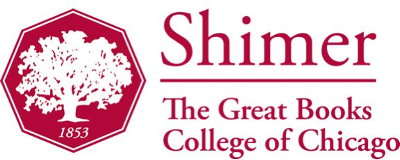
About
Shimer College
|
 
|
|
Dave Buchanan, Admissions Officer at Shimer College, often asks me to send a letter to students who are considering going to Shimer, particularly those who are considering teaching as a career. I did both and it has been a magical combination. I
have two great lasting gifts in my life. One is the education I
received at Shimer, and the other is a job I love so much that it
defines part of who I am. I spent only my final two years at Shimer,
but of the seventeen years I spent in post secondary education,
it was by far the best education I ever received anywhere and it
opened the doors to a career that I love: I now teach
at York University in Toronto, and when my paycheque comes, I still
marvel that they pay me for doing this. My
story is about how Shimer prepared me for my career. I knew from third
grade that I wanted to teach. My father believed passionately in the
value of a good liberal arts education. Way back in the 1960's, he said
that the world changes too fast to know exactly at nineteen what you
will want to/have to/love to do for a living when you are older. He
said then that a good liberal arts education would give you the
ability to do whatever you want to do. In today's even more rapidly changing
world, this is even truer. I only wish he had lived long enough to see
how right he was. If you looked at my résumé: what I have done, and
what I am doing now, you would think that I was a fantastic long-range
planner, but nothing could be farther from the truth. My Shimer
education had taught me how to adapt. I completed my Shimer B.A. in 1968 and taught in the local Mt. Carroll school system. Because I had changed universities, I had not had time to take any education courses, but I knew a lot about a lot of subjects, and I knew how to teach, having seen it done so well at Shimer. They needed teachers and so they gave me a job. I took my education courses and obtained my teaching certificate while teaching fourth, fifth, and sixth grade. I loved teaching, but I was married and my husband at the time stood as a resister to the United States Army draft and we went to Chicago when he was given alternative service. Thus I found myself in Chicago in the early 1970's with no teaching jobs available. So I took a job as a temporary switchboard operator in a small investment firm. To succeed in Finance, I needed an M.B.A., so I went back to school. I remembered Economics at Shimer consisting of things like discussions of the ethics of trade with Red China. I literally did not know what a supply and demand curve was, and I was competing with undergraduate business majors. Thanks to my Shimer education in reading, thinking, analyzing, and learning, I quickly caught up. I still remember sitting in an M.B.A. lecture in Microeconomics on pricing theory, and suddenly seeing the underlying connection between Calculus, Accounting, and Microeconomics, my first three courses in the M.B.A. I tried to explain my excitement to some of my classmates, but they, trained as they were in very narrow fields, with no liberal arts education to guide them, were not only unable to see my point, they really weren't very interested in hearing about it. This was their loss. That is what the world is really about: understanding the underlying relationships and connectedness of the world, and this is one of the best lessons provided by a Shimer education.
I
enjoyed some parts of the business world, and, due to the breadth of my Shimer
education was able to function well, but ultimately could not abide
the lack of social conscience I saw as necessary to truly succeed,
and besides, I desperately missed
teaching. I also had learned at Shimer to follow my heart and do what
I love. I eventually parlayed my M.B.A. and my teaching experience
into a contract teaching position at York University. Knowing I needed
more education, I went back to get a Ph.D. Again, my Shimer education
enabled me to succeed. I had an M.B.A. in Finance, but had decided
that what I really wanted to do was Marketing. I had taken only one
Marketing course in my life, but I knew it was based in all the things
that I had loved in the Social Sciences at Shimer: human relationships
and behaviour, psychology, anthropology, and sociology. So I got myself into the
Marketing doctoral programme at the University of Toronto. Once
again, my Shimer education served me well. I knew how to study and how
to learn. Soon I found that I could do the same work for the seminar
in much less time than it took my classmates who had master's degrees
in Marketing. This is not bragging, nor did it result in my having
superior grades. It was a matter of survival. I was married, to a
different husband by this time, one who could live with an educated
woman. He is a small business owner, however, and we could not afford
for me to quit work to do the doctorate. So I did it full time while
working full time at York. Had I not learned so well at Shimer how to
analyze and synthesize, how to critically read and write, how to
balance my time, I simply would not have survived. The
confidence I acquired at Shimer enabled me to make the transition from
teaching primary school to teaching university, and eventually to
branch out from Business to also teach in Environmental Studies and
Women's Studies, although I confess that I never told my first several
years' students exactly where I had taught before; when they asked,
I just said, "Chicago!" Shimer also gave me the expectation that I would be
treated as an equal. No one ever questioned anything I said in a
Shimer class
because I was a female, or because I was "only a student."
We all questioned each other, professors and students, men and women,
because that was the process, but never because of inequality. This
has given me a definite edge in the real world where prejudices do
exist, but where, if you don't believe they relate to you, they often
don't. There is something wonderful about having had an experience
where you were truly valued for yourself regardless of gender, race,
class, age, or academic status, which enables you to fight prejudice
when you do encounter it. I also found that after completing a Shimer
education, both the M.B.A. and the doctorate were easy by comparison.
I never again found in any school or at any level of degree, the
deeply exciting
academic challenge that I found at Shimer. The
real reason for getting a Shimer education is the ability to find your
own challenges, to keep educating yourself. It gives you a breadth of
experience in all the arts that will sustain you through life. I am a
voracious reader; during my doctorate I read, for fifteen minutes
before bed, most of the contemporary
Canadian female novelists. I love music, and have an eclectic taste
for everything from jazz to country to Mozart. I love theatre. I love
art (well, I can't stand
Rauschenberg, but that's a personal thing). I love talking to people,
and can hold my own in almost any conversation because I know how to
listen (another invaluable lesson in the Shimer experience), how to
construct arguments, how to think on my feet. I was elected to the
highest academic position at York - Chair of the University Senate,
largely because I had impressed so many people in Senate with my
ability to think on my feet, and to speak eloquently at a moment's
notice. All this from a girl who in eighth grade used to throw up when
asked to speak in public. Shimer gave me that confidence and those
skills. If
you are considering teaching, particularly at the post-secondary
level, you will need to be able to think, analyze, synthesize, and
write, and to do it quickly and well. You will need a Shimer
education. You will want further graduate education if you are going
to pursue this career, and Shimer will give you the preparation to do
it well. More than anything, however, your Shimer experience will give
you the ability to continue educating yourself and enriching your life
no matter what you choose to do. Shimer
is not an easy place. Classes are small; no class has more than twelve
students. You have to
prepare; classes take place around an octagonal table and there is
nowhere to hide if you haven't read the material. If you cut class,
your professor is going to run into you and ask, kindly, where you
were. In the “real” world, of course, you can't teach a class that
you haven't prepared for, you can't go into a University Senate
meeting without having read the agenda, and you can't cut work the day
you have to do a presentation. Shimer College provides wonderful preparation for the real
world. I hope this letter conveys to you my passion for Shimer. You will have noticed that I refer often to "the Shimer experience." This is because many of the things taught at Shimer are not written into the formal curriculum, but are some of the most valuable lessons you will learn in your life. I wish you all the best in making your decision. If you would like to talk to me about Shimer, please feel free to email me at lripley@yorku.ca. Sincerely
yours, M Louise Ripley, B.A., M.B.A., Ph.D. |
|